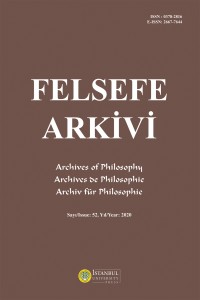Öz
Schopenhauer assumes that our physical drives, on which depend our desires and wants, set the ground of knowledge and being. These drives are in the very source of our biological as well as our intellectual acts, i.e. at the essential content of man as a rational being. Moreover, not only men, but all beings, organic and inorganic get objectivity as a product of will. Will is the thing-in-itself which shows itself in the reality as a whole and in individual objects. Schopenhauer argues that the thing-in-itself is will. In short, he will say that the “thing-in-itself” has an intelligible quality and that it is “will”. Kant associates the unknown character of the first cause with the inconclusive research of causes. This case, known as “the third antinomy”, takes the principle of causality to the impossibility of the existence of the first cause. Schopenhauer’s famous criticism of Kant relies on this point. Thus, he goes on to construct his own theory of causality and of space-time. Schopenhauer does this in the context of the sufficient reason principle. This study examines how this principle is handled by Schopenhauer in the famous fourfold root doctrine. According to Schopenhauer, there are four principles that govern four separate classes of objects. It is precisely this last principle which opens the way to Schopenhauer's metaphysics of will. His original interpretation appears at this point against traditional metaphysics. This study examines the theoretical roots of this philosopher's later, practical tendencies.
Anahtar Kelimeler
Schopenhauer the principle of sufficient reason fourfold root will Kant thing-in-itself becoming knowing being acting
Kaynakça
- Aristoteles. Metafizik. Çeviren Ahmet Arslan. İstanbul: Sosyal yayınlar, 2012.
- Caldwell, William. “Schopenhauer’s Criticism of Kant.” Mind 16, No. 63 (1891): 355-374.
- Copleston, Frederick. Nihilizm ve Materyalizm. Çeviren Deniz Canefe. İstanbul: İdea Yayınları, 1996.
- Gardiner, Patrick. Schopenhauer. Bristol: Thoemmes Press, 1997.
- Hamlyn, David W. “Schopenhauer on the Principle of Sufficient Reason.” Schopenhauer: His Philosophical Achievement. Ed. Michael Fox. Brighton: Harvester Press, 1980.
- Janaway, Christopher. Schopenhauer: A Very Short Introduction. Oxford: Oxford University Press, 2002.
- Leibniz, Gottfried Wilhelm. New Essays on Human Understanding. Philosophical Essays. Ed. R. Ariew and D. Garber. Indianapolis: Hackett Publishing, 1989.
- Schopenhauer, Arthur. Die Welt als Wille und Vorstellung I. Sämtliche Werke in fünf Bänden - Band I. Frankfurt a. M.: Suhrkamp, 1986.
- -------. Die Welt als Wille und Vorstellung II. Sämtliche Werke in fünf Bänden - Band II. Frankfurt a. M.: Suhrkamp, 1986.
- -------. Über die vierfache Wurzel des Satzes vom zureichenden Grunde. Eine philosophische Abhandlung. Sämtliche Werke in fünf Bänden - Band III: Kleinere Schriften. Frankfurt a. M.: Suhrkamp, 1986.
- Wittgenstein, Ludwig. Tractatus Logico-Philosophicus. Çeviren Oruç Aruoba. İstanbul: YKY Yayınları, 1996.
Öz
Schopenhauer’a göre bedenimiz ve buna bağlı olarak ortaya çıkan arzu ve isteklerimiz varlığın ve bilginin temelini oluşturur. Bedenimiz, yalnızca canlı varoluşumuzun cisimsel dayanağı değildir; aynı zamanda zihinsel edimlerimizin, bir başka ifadeyle, akıl sahibi bir varlık olarak düşünüyor oluşumuzun koşulu konumundadır. Öte yandan yalnızca insan değil, organik ve inorganik tüm varlık alanı, bedensel istemenin yöneldiği gerçekliği tesis etmektedir. Çünkü isteme (Wille), bütünüyle gerçekliğin kendisinde ve tek tek nesnelerinde kendini gösteren kendinde-şeydir. Schopenhauer kendinde-şeyin isteme olduğunu ileri sürer. Kant, ilk nedenin bilinemezliğini, aklın nedenleri sonsuzca arama eğilimine bağlamıştır. Üçüncü antinomi olarak bilinen bu durum, Kant’ın nedensellik ilkesini, bir ilk nedenin varlığının olanaksızlığına taşır. Schopenhauer’ın ünlü Kant eleştirileri bu noktadan beslenir ve onu kendi nedensellik ve uzay-zaman teorisini kurmaya iter. Schopenhauer bunu yeter sebep ilkesi çerçevesinde yapmaktadır. Eldeki çalışmada bu ilkenin Schopenhauer tarafından ünlü dörtlü kök öğretisi içinde ele alınışı incelenmektedir. Schopenhauer’a göre dört ayrı nesne sınıfını yöneten dört ayrı ilke bulunur. Bunların birincisi oluşun yeter sebep ilkesidir; bu ilke fiziksel nesneler alanını yönetmektedir. İkincisi bilginin yeter sebep ilkesidir; bu ilke ise mantıksal nesneler alanını yönetmektedir. Üçüncüsü ise varlığın yeter sebep ilkesidir; bu ilke de matematiksel nesneler sınıfını yönetmektedir. Dördüncü ve sonuncusu ise eylemin yeter sebep ilkesidir ve o da moral nesneler dünyasını yönetir. Tam da bu sonuncu ilke, Schopenhauer’ın isteme metafiziğine giden yolu açar. Onun, geleneksel metafizik karşısındaki özgün yorumu bu noktada ortaya çıkar. Bu çalışma, bu filozofun daha sonraki, pratik denebilecek eğilimlerinin teorik köklerini incelemektedir.
Anahtar Kelimeler
Schopenhauer yeter sebep ilkesi dörtlü kök isteme Kant kendinde şey oluş bilgi varlık eylem
Kaynakça
- Aristoteles. Metafizik. Çeviren Ahmet Arslan. İstanbul: Sosyal yayınlar, 2012.
- Caldwell, William. “Schopenhauer’s Criticism of Kant.” Mind 16, No. 63 (1891): 355-374.
- Copleston, Frederick. Nihilizm ve Materyalizm. Çeviren Deniz Canefe. İstanbul: İdea Yayınları, 1996.
- Gardiner, Patrick. Schopenhauer. Bristol: Thoemmes Press, 1997.
- Hamlyn, David W. “Schopenhauer on the Principle of Sufficient Reason.” Schopenhauer: His Philosophical Achievement. Ed. Michael Fox. Brighton: Harvester Press, 1980.
- Janaway, Christopher. Schopenhauer: A Very Short Introduction. Oxford: Oxford University Press, 2002.
- Leibniz, Gottfried Wilhelm. New Essays on Human Understanding. Philosophical Essays. Ed. R. Ariew and D. Garber. Indianapolis: Hackett Publishing, 1989.
- Schopenhauer, Arthur. Die Welt als Wille und Vorstellung I. Sämtliche Werke in fünf Bänden - Band I. Frankfurt a. M.: Suhrkamp, 1986.
- -------. Die Welt als Wille und Vorstellung II. Sämtliche Werke in fünf Bänden - Band II. Frankfurt a. M.: Suhrkamp, 1986.
- -------. Über die vierfache Wurzel des Satzes vom zureichenden Grunde. Eine philosophische Abhandlung. Sämtliche Werke in fünf Bänden - Band III: Kleinere Schriften. Frankfurt a. M.: Suhrkamp, 1986.
- Wittgenstein, Ludwig. Tractatus Logico-Philosophicus. Çeviren Oruç Aruoba. İstanbul: YKY Yayınları, 1996.
Ayrıntılar
| Birincil Dil | Türkçe |
|---|---|
| Konular | Felsefe |
| Bölüm | Makaleler |
| Yazarlar | |
| Yayımlanma Tarihi | 18 Temmuz 2020 |
| Yayımlandığı Sayı | Yıl 2020 Sayı: 52 |


